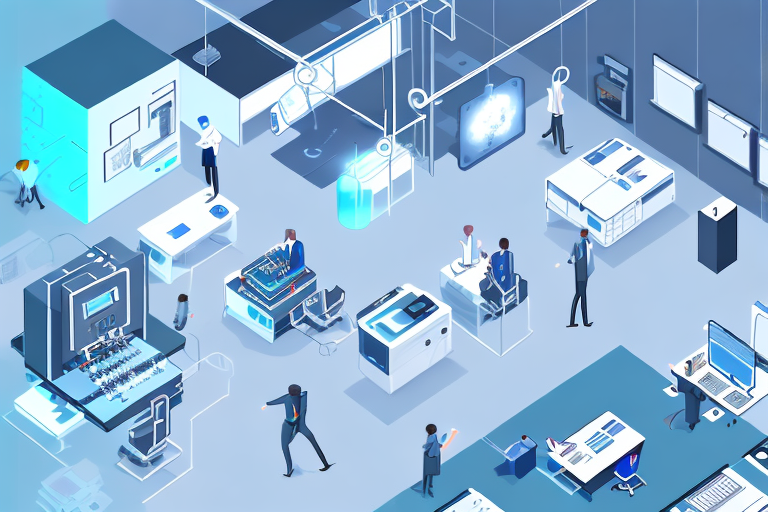Artificial Intelligence (AI) has emerged as a game-changer in various industries, and its impact on accounting and finance is no exception. By automating processes, analyzing vast amounts of data, and offering valuable insights, AI has the potential to revolutionize the way financial tasks are conducted. In this article, we will explore the basics of AI, its intersection with accounting, the benefits it brings, the challenges faced in implementing it, and the future of AI in the field of accounting and finance.
Understanding the Basics of Artificial Intelligence
Before we delve into the role of AI in accounting, it is important to define what AI actually is. Artificial Intelligence, in its simplest form, refers to the ability of machines to perform tasks that would typically require human intelligence. AI systems can learn from experience, adapt to new situations, and simulate human thinking processes.
Artificial Intelligence encompasses various technologies, including machine learning, natural language processing, computer vision, and robotic process automation. These technologies enable machines to process and analyze data, recognize patterns, understand language, and make informed decisions.
Machine learning, a subset of AI, is a powerful tool that allows computers to learn from data and improve their performance over time. By analyzing large datasets, machine learning algorithms can identify patterns and make predictions or decisions based on that information.
Natural language processing (NLP) is another important aspect of AI. It involves the ability of machines to understand and interpret human language. NLP algorithms can analyze text, extract meaning, and generate responses that are relevant and coherent.
Computer vision is the field of AI that focuses on enabling machines to understand and interpret visual information. With computer vision, machines can analyze images or videos, recognize objects or faces, and even understand emotions expressed through facial expressions.
Robotic process automation (RPA) is a technology that allows machines to automate repetitive tasks. By mimicking human actions, RPA can perform tasks such as data entry, data extraction, and report generation, freeing up human workers to focus on more complex and strategic activities.
The Role of AI in Modern Technology
The widespread adoption of AI can be attributed to its ability to enhance efficiency, accuracy, and decision-making in various industries. AI algorithms enable machines to perform complex tasks without human intervention, making it a valuable tool in industries like healthcare, manufacturing, and finance.
In the healthcare industry, AI is revolutionizing patient care and diagnosis. AI-powered systems can analyze medical records, images, and genetic data to identify patterns and make accurate predictions about diseases or treatment outcomes. This can help doctors make more informed decisions and provide personalized treatment plans.
In manufacturing, AI is being used to optimize production processes and improve quality control. AI algorithms can analyze sensor data from machines, identify anomalies or potential failures, and take corrective actions in real-time. This not only reduces downtime but also ensures that products meet the highest quality standards.
In the finance industry, AI is transforming the way financial institutions operate. AI-powered chatbots can provide customer support and answer queries, freeing up human agents to handle more complex tasks. AI algorithms can also analyze large volumes of financial data to detect fraud or identify investment opportunities, helping financial institutions make better decisions and mitigate risks.
AI is also making its way into the transportation industry, with self-driving cars being one of the most prominent examples. By combining computer vision, machine learning, and sensor technologies, self-driving cars can navigate roads, detect obstacles, and make decisions in real-time. This has the potential to revolutionize transportation by reducing accidents and congestion, and improving fuel efficiency.
As AI continues to advance, its applications and impact on various industries will only grow. From personalized medicine to autonomous robots, AI has the potential to reshape the way we live and work. It is an exciting field that holds immense promise for the future.
The Intersection of AI and Accounting
Now that we have a clear understanding of AI, let’s explore its intersection with accounting. The financial landscape is rapidly evolving, and accountants are facing increasing pressure to deliver accurate and timely information. AI offers a range of solutions that can help accountants overcome these challenges.
Accounting is a field that heavily relies on data analysis. The accuracy and efficiency of financial data analysis are crucial for making informed business decisions. Traditionally, financial analysis has been a time-consuming process that involves manual data entry, calculations, and analysis. However, with the advent of AI, these tasks can be automated, allowing accountants to focus on more complex and strategic activities.
AI in Financial Data Analysis
AI algorithms have the ability to quickly analyze large volumes of financial data. By processing this data, AI can identify patterns and generate valuable insights. This can be particularly useful in detecting fraudulent activities or identifying potential risks. With AI-powered financial data analysis, accountants can make more accurate predictions, assess financial performance, and identify areas for improvement.
Furthermore, AI can also assist accountants in regulatory compliance. With ever-changing financial regulations, it can be challenging for accountants to stay up-to-date and ensure compliance. AI-powered systems can analyze regulatory requirements and automatically flag any potential non-compliance issues, saving accountants valuable time and reducing the risk of penalties.
AI and Automated Accounting Tasks
In addition to data analysis, AI can also streamline and automate routine accounting tasks. Manual data entry, reconciliation, and reporting can be time-consuming and prone to errors. AI-powered systems can automate these processes, reducing the risk of human error and freeing up accountants’ time to focus on higher-value activities.
For example, AI can automate the process of invoice processing. By using optical character recognition (OCR) technology, AI can extract relevant information from invoices, such as vendor details and payment amounts, and automatically update the accounting system. This not only saves time but also reduces the likelihood of errors that may occur during manual data entry.
Moreover, AI can assist in financial forecasting and budgeting. By analyzing historical financial data and market trends, AI algorithms can generate accurate predictions and help accountants make informed decisions about resource allocation and financial planning.
Overall, the intersection of AI and accounting holds great promise for the future of the profession. By leveraging AI technologies, accountants can enhance their analytical capabilities, improve accuracy, and streamline routine tasks. As the financial landscape continues to evolve, embracing AI can empower accountants to deliver greater value to their organizations and clients.
Benefits of AI in Accounting and Finance
By leveraging AI, accounting and finance departments can experience numerous benefits that have a significant impact on their operations.
AI technology has revolutionized the field of accounting and finance, offering a wide range of advantages that enhance accuracy, increase efficiency, and drive overall productivity. With the ability to automate tasks and analyze vast amounts of data, AI-powered systems have become indispensable tools for financial professionals.
Enhancing Accuracy with AI
One of the key advantages of AI in accounting and finance is its ability to enhance accuracy. Mistakes in financial data can lead to costly errors and misinterpretation of information. AI-powered systems can significantly reduce these errors by automating data entry, verifying transactions, and identifying inconsistencies.
Through advanced algorithms and machine learning capabilities, AI can analyze financial data with precision and identify patterns that may go unnoticed by human accountants. This not only ensures accurate financial reporting but also helps in detecting potential fraud or irregularities.
Furthermore, AI can continuously learn and improve its accuracy over time, adapting to changing financial regulations and industry standards. This enables accounting and finance departments to stay compliant and make informed decisions based on reliable and up-to-date information.
Increasing Efficiency through AI
AI technology can also greatly increase efficiency in accounting and finance tasks. Automation of repetitive tasks allows accountants to complete their work more quickly and redirect their efforts towards more strategic initiatives. This not only saves time but also improves overall productivity within the department.
With AI-powered systems, routine activities such as data entry, invoice processing, and reconciliation can be automated, reducing the risk of human error and freeing up valuable time for accountants to focus on more complex and value-added tasks. This shift from manual to automated processes not only improves efficiency but also minimizes the chances of delays and bottlenecks in financial operations.
Moreover, AI can analyze large volumes of financial data in real-time, providing instant insights and actionable recommendations. This enables finance professionals to make data-driven decisions quickly, contributing to better financial planning, forecasting, and risk management.
Additionally, AI-powered chatbots and virtual assistants can assist both internal and external stakeholders by answering queries, providing self-service options, and offering personalized financial advice. This improves communication and enhances the overall customer experience, leading to increased satisfaction and loyalty.
In conclusion, AI has become a game-changer in the field of accounting and finance. By enhancing accuracy, increasing efficiency, and enabling better decision-making, AI-powered systems empower financial professionals to streamline their operations, drive growth, and stay ahead in an ever-evolving business landscape.
Challenges and Solutions in Implementing AI
While the benefits of AI are substantial, there are challenges that organizations may face when implementing AI in their accounting and finance processes.
Overcoming Resistance to AI in Accounting
Resistance to change is a common challenge when introducing new technologies. Accountants and finance professionals might be hesitant to embrace AI due to fears of job displacement or concerns about the reliability of AI-generated insights. To address these concerns, organizations must invest in training and education to ensure that employees understand the benefits of AI and are equipped with the skills needed to work alongside AI systems.
Addressing AI Security Concerns
Another challenge in implementing AI in accounting and finance is data security. The sensitive nature of financial data requires robust security measures to protect against unauthorized access and data breaches. Organizations must ensure that their AI systems adhere to stringent security protocols and are regularly audited to maintain data integrity and confidentiality.
The Future of AI in Accounting and Finance
As AI continues to advance, its impact on the accounting and finance industry is poised to grow exponentially.
Predicting Trends in AI and Finance
One trend that we can expect to witness is the integration of AI with other emerging technologies like blockchain and big data analytics. This convergence will enable accountants to leverage AI’s data analysis capabilities in combination with the transparency and security provided by blockchain technology.
Preparing for an AI-Driven Financial Industry
With the increasing adoption of AI, accountants and finance professionals must adapt and acquire new skills to thrive in an AI-driven financial industry. Continuous learning, development of analytical skills, and strategic thinking will be crucial in harnessing the full potential of AI and staying relevant in tomorrow’s financial landscape.
In conclusion, AI holds tremendous potential to transform accounting and finance tasks. By automating processes, improving accuracy, and providing valuable insights, AI is revolutionizing the way financial professionals operate. While challenges exist, organizations that embrace and successfully implement AI in their operations will have a competitive advantage in the ever-evolving financial industry.



